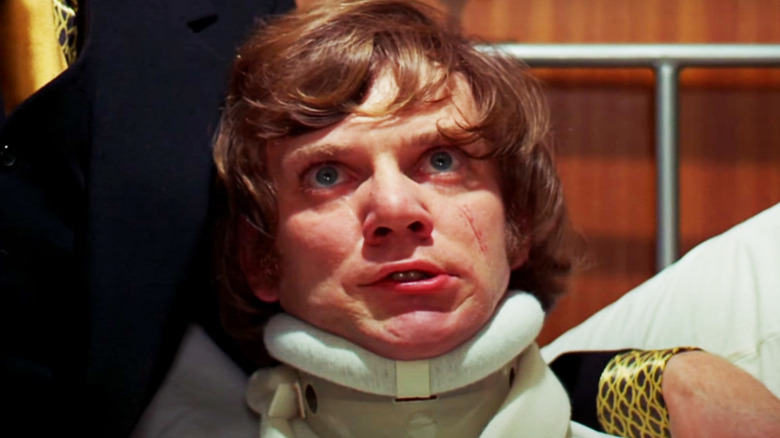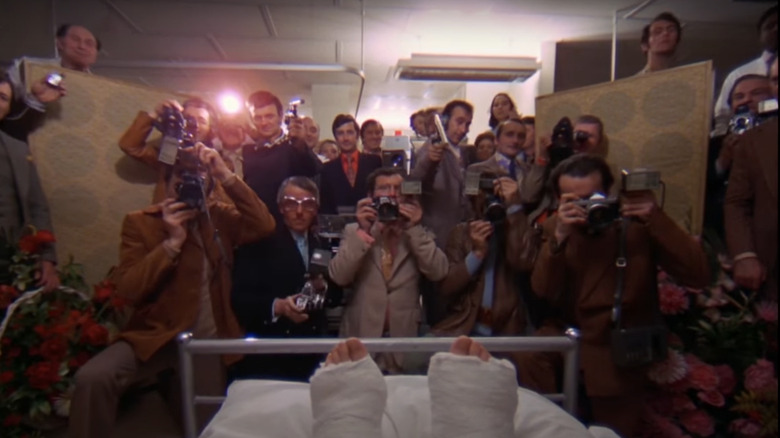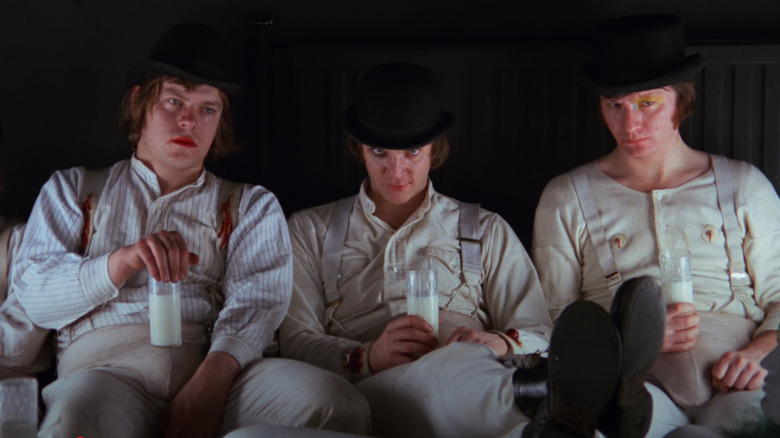Why Stanley Kubrick's A Clockwork Orange Has A Different Ending From The Book
Though he's known for his symmetrical compositions and that infamous stare, Stanley Kubrick was always chiefly concerned with story. If it wasn't for good stories there would be no great Kubrick films — as evidenced by the fact the celebrated auteur never made a movie that he hadn't adapted from someone else's work (barring an early noir effort he co-wrote). From "Lolita" to "Eyes Wide Shut," Kubrick would scour the cultural landscape for stories worth adapting, usually finding them in novels. And in the case of 1971's "A Clockwork Orange," the director would adhere to Anthony Burgess's 1962 work of fiction arguably more closely than with any of his later films.
Kubrick respected Burgess' novel greatly, calling it "brilliant and original." That's not to say he didn't feel similarly about other source material he worked with, but the director also had a knack for disappointing the originators of that material. Gus Hasford, author of "The Short-Timers," which formed the basis of "Full Metal Jacket," was not happy with what he saw on Kubrick's set, and Stephen King famously hated the filmmaker's adaptation of "The Shining." But, with "A Clockwork Orange," Kubrick remained remarkably faithful to Burgess' vision.
That said, though Burgess initially seemed impressed with Kubrick's efforts, telling the press, "This is one of the great books that has been made into a great film," he eventually soured on it. Much of that was likely the result of having to stand in for the travel-averse Kubrick on the "A Clockwork Orange" press run and field harsh questions about the film's perceived degrading impact on that age-old concern of the ill-informed: "society." But there was also one major difference between Burgess' original novel and Kubrick's film that may have been more of a sticking point for the author than he let on.
'I was cured all right'
"A Clockwork Orange," both in its print and screen versions, proved controversial for its depiction of violence in a dystopian future Britain, but its story explored serious issues. As Stanley Kubrick surmised, "The central idea of the film has to do with the question of free will. Do we lose our humanity if we are deprived of the choice between good and evil?" And in the director's view, the answer to that question was an emphatic "yes."
In the film, Malcolm McDowell's Alex DeLarge undergoes aversion therapy to "cure" him of his violent impulses. But after becoming a so-called "productive member of society," he's depicted as a hollow creation of an authoritarian government. He eventually attempts to die by suicide, only to wake up in a hospital and find his old proclivity for ultra violence has returned. Both Kubrick and Anthony Burgess drew a parallel between the depravity of Alex's delinquency, the authorities' relentless focus on ridding their society of crime at any cost, and the behavioral psychologists that so assuredly "treat" Alex with aversion therapy. The troubling suggestion at the heart of it all is that they're all as bad as each other.
But in Burgess' original vision of the story, the final chapter saw Alex undergo a personal conversion of his own, having rediscovered his violent urges only to decide he's probably better off giving it all up and settling into a more conformist existence. When "A Clockwork Orange" came to North America, the U.S. publisher W. W. Norton decided that chapter wasn't necessary, and convinced Burgess to allow them to publish a version without it, resulting in a novel that finishes on the line "I was cured all right." It was this version that Kubrick read and adapted.
Kubrick knew what was best for the film
According to The International Anthony Burgess Foundation, the writer claimed he felt pressured to change the novel for its U.S. debut, despite initially agreeing that cutting the final chapter actually improved the book. Interestingly, Burgess also wrote his own script for the film long before Stanley Kubrick took a pass at it, and in this 1966 screenplay, he too dropped the final chapter.
However the author really felt about nixing Alex's final conversion, Kubrick was resolute in his belief that the story was better without it and that his ending for "A Clockwork Orange" worked. Speaking to writer, critic, and director Michael Ciment, the director said:
"There are two different versions of the novel. One has an extra chapter. I had not read this version until I had virtually finished the screenplay. This extra chapter depicts the rehabilitation of Alex. But it is, as far as I am concerned, unconvincing and inconsistent with the style and intent of the book. I wouldn't be surprised to learn that the publisher had somehow prevailed upon Burgess to tack on the extra chapter against his better judgment, so the book would end on a more positive note. I certainly never gave any serious consideration to using it."
Considering the respect "A Clockwork Orange" has garnered since its release, it would seem both Kubrick and the novel's U.S. publishers were right. That final "I was cured all right" makes for a disturbing end to a film that revels in that very energy throughout. Whether Burgess was a fan of the choice or not, it's a reminder that while Kubrick may have always relied on other writers for inspiration, he only ever relied on his own instincts when bringing those stories to the big screen.


